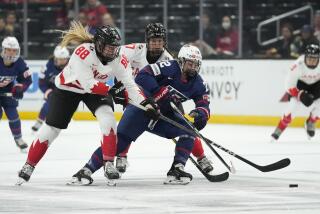Likely Work Stoppage Threatens NHL’s Future
- Share via
WASHINGTON — The NHL is not just in danger of a long labor lockout or a lost season. Professional hockey, though it seems oblivious to its mortal risk, may be on the brink of losing its place as a major team sport.
Last week, after a 2 1/2-hour meeting with the head of the NHL Players Association, Commissioner Gary Bettman was asked if the NHL would open training camp for next season without a new labor agreement. “We cannot live under the collective bargaining agreement for any longer than its term,” Bettman said.
That’s not an announcement of a lockout by NHL owners for next season. But it’s about as close as you can get.
“While there was candid discussion, it would be misleading to suggest that there was any progress made or to characterize our discussions as productive,” said Ted Saskin, the union’s senior director. No more talks are scheduled.
At about the same time, washingtonpost.com, the Post’s Web site, ran an online poll asking which teams would be in the Stanley Cup finals. The largest response -- 42 percent of users -- was: “Didn’t realize the NHL playoffs were going on.” The NHL just doesn’t get it. Both the owners and players are living in a parallel universe of complete delusion. Because they love hockey, they think everybody cares about it. Because they can’t imagine a world without the NHL, they don’t realize the majority of sports fans care little whether the NHL even exits.
If you doubt it, check the TV ratings for the Finals From Neilsen Hell between the Calgary Flames and the Tampa Bay Lightning. If the Weather Channel had a power outage, its ratings would still crush the NHL’s numbers.
In almost every respect, the fight between the NHL’s owners and players mirrors the battle in baseball that led to the strike of 1994 and the cancellation of the World Series. The financial issues, long-standing personal animosity and hard-line rhetoric could hardly be more similar.
However, there is one huge difference.
Baseball is America’s national pastime. Hockey is Canada’s national pastime. Yet the NHL is counting on American fans and American dollars to come back to the NHL the way they came back to baseball. What business would take such a bet? What union would tempt such career suicide for its members?
No one should doubt the seriousness of both sides, certainly not the owners who are already firing team employees or not replacing those who quit. Teams including Washington, Carolina, Dallas, Florida, Edmonton, St. Louis, Anaheim and Phoenix have laid off or plan to lay off a substantial number of employees. At last count, the Caps had fired four people in hockey operations while seven people in other departments had quit.
After a lockout and a lost season, which is currently considered the highest probability outcome, there would certainly still be an NHL in some form. But what form would that be? How many teams would it contain? What would its attendance be? Just because baseball is in excellent health after a fundamental breach of trust with its customers, that should not serve as some sort of subliminal message to hockey’s owners and players.
Here’s the kicker, the wild card, the enormous factor the NHL seems not to have considered. The imminent danger for hockey is that if it does anything as destructive as baseball did in ‘94-’95, the NHL may lose its status alongside the NFL, MLB and NBA as a major professional team sport.
“Major” is a vague but invaluable distinction conferred in the public mind. Some sports, some events, are major. Some aren’t. There’s no election, no referendum. Nobody calls to tell you on the day you move from one category to the other. But, over time, it happens. And for years hockey has been slipping back toward “minor.” In its most recent TV contract, the NHL accepted terms that were comparable to the Arena Football League.
Once a major sport falls back into the pack of wannabes, it never recovers. Once, prize fighting and horse racing were huge national sports, far bigger than hockey has ever dreamed of being.
Does hockey understand that if it shrinks in popularity as much as boxing and horse racing that it will not just be small, it will almost be invisible? Can you say, bowling? Actually, that would be an insult to bowling with its large participant base.
Hockey’s owners think they can freeze the sport for a year to save money, then thaw it out in a wonderful new world with a hard salary cap, a docile union and a fan base that will gradually forgive everybody. Hockey players apparently think it’s smart to call this bluff. Perhaps only those in an insular culture like hockey could believe this.
The awful TV ratings for the Stanley Cup may, in a bizarre way, serve as a wake-up call. Before the finals, the NHL’s ratings were one-fourth that of the NBA. Now, the Lightning and Flames, two small-market teams, are further shrinking those figures. Games 1 and 2 tied for the lowest Cup ratings on cable since 1990. Games 3 and 4 were two of the lowest for hockey since broadcast network numbers began.
Aside from dedicated hockey fans, how many know the Flames’ best player, and perhaps the best player in the whole sport, is Jarome Iginla?
And how many realize he’s the first black captain of an NHL club? The NHL has many nice stories like this that are worth sharing with a wider world.
But, after a lockout, how many will still care?
Pro hockey better realize what many of us understand intuitively.
Most people can do without the NHL. The sport survives off the adoration of a relatively small hard core. After a lost season, plenty of fans might express a preference for a less cluttered sports scene in which the NHL came back as a much less visible game.
Sometimes a slap in the face is useful. The NHL needs to understand that, if it goes away for a year, the sports public -- which has so many games, seasons and athletes -- may discover it prefers a world with far fewer pro hockey highlights on TV or NHL stories in newspapers and magazines.
With a year to think about it, we might ask whether we really needed to know so much more about the NHL than we do about women’s golf or college lacrosse or pro soccer or NASCAR or who knows what?
Why, we might ask, is the NHL covered like a major sport? What’s so important about it? If few missed it when it was gone, why treat it as a major sport when it comes back?
So, NHL, do you feel lucky? Go on, take a season off.
Make our day.
More to Read
Go beyond the scoreboard
Get the latest on L.A.'s teams in the daily Sports Report newsletter.
You may occasionally receive promotional content from the Los Angeles Times.






